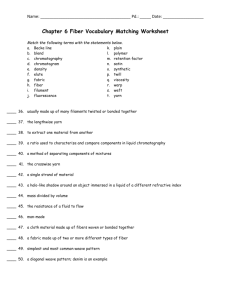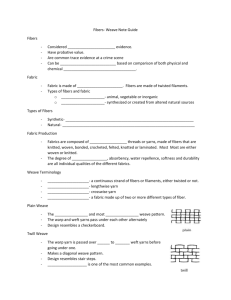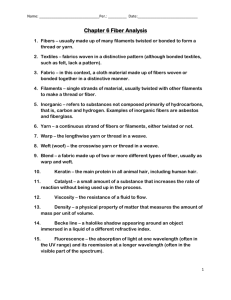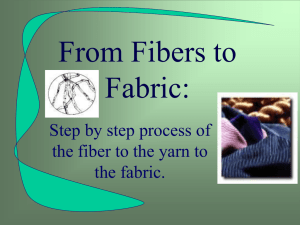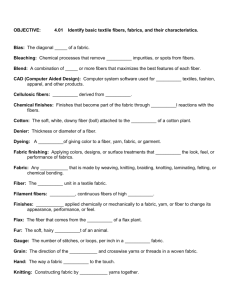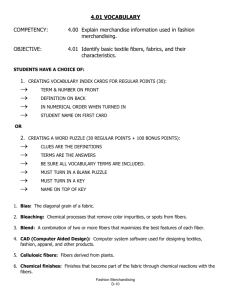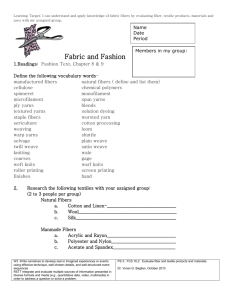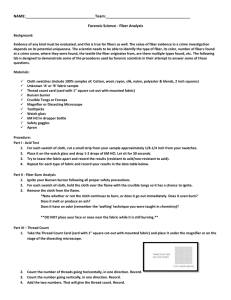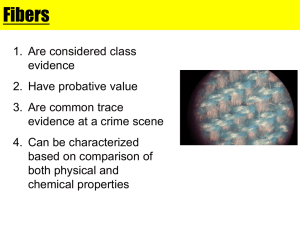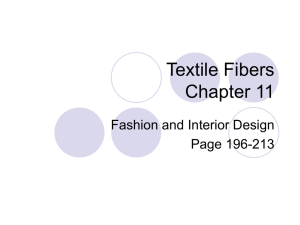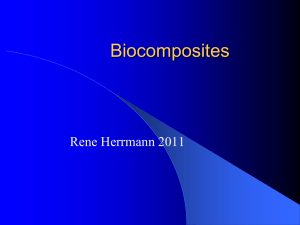Fiber
advertisement
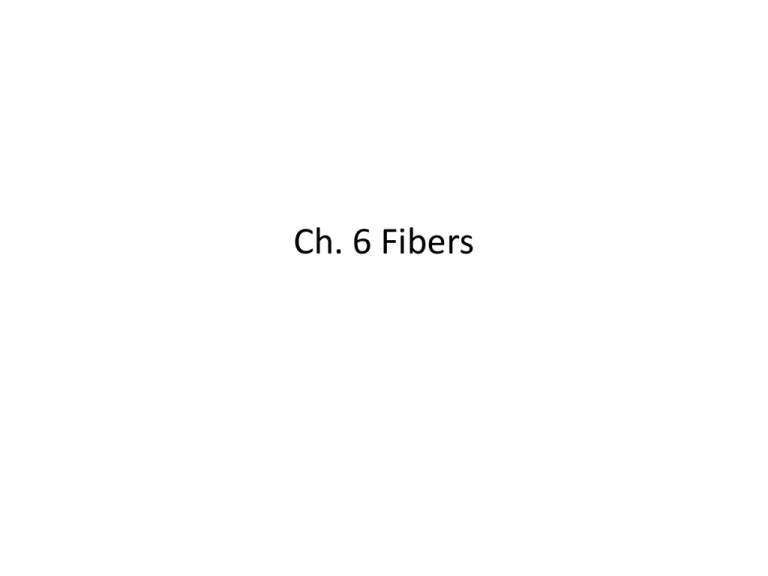
Ch. 6 Fibers Fibers Fabrics Are considered class evidence Fabric is made of fibers. Fibers are made of twisted filaments. Have probative value Types of fibers and fabric: Natural—animal, vegetable, or inorganic Artificial—synthesized or created from altered natural sources Are common trace evidence at a crime scene Can be characterized based on comparison of both physical and chemical properties 2 Types of Fibers Synthetic Rayon Nylon Acetate Acrylic Spandex Natural Silk Cotton Wool Mohair Cashmere Polyester 3 Classification Natural fibers are classified according to their origin: Vegetable or cellulose, Animal or protein, Mineral Cellulose Fiber Protein Fiber Cotton—vegetable fiber; strong, tough, flexible, moistureabsorbent, not shape-retentive Wool—animal fiber coming most often from sheep, but may be goat (mohair), rabbit (angora), camel, alpaca, llama, or vicuña Rayon—chemically altered cellulose; soft, lustrous, versatile Cellulose acetate—cellulose that is chemically altered to create an entirely new compound not found in nature Silk—insect fiber that is spun by a silkworm to make its cocoon; the fiber reflects light and has insulating properties 4 Mineral Fiber Synthetic Fibers –made from derivatives of petroleum Asbestos—a natural fiber that has been used in fireresistant substances Nylon—most durable of manmade fibers; extremely lightweight Rock wool—a manufactured mineral fiber Fiberglass—a manufactured inorganic fiber Polyester—most widely used man-made fiber Acrylic—provides warmth from a lightweight, soft, and resilient fiber Spandex—extreme elastic properties 5 Fabric Production Fabrics are composed of individual threads or yarns that are made of fibers and are knitted, woven, bonded, crocheted, felted, knotted, or laminated. Most are either woven or knitted. The degree of stretch, absorbency, water repellence, softness, and durability are all individual qualities of the different fabrics. 6 Weave Terminology Yarn—a continuous strand of fibers or filaments that may be twisted together Warp—lengthwise yarn Weft—crosswise yarn Blend—a fabric made up of two or more different types of fibers 7 Weave Patterns 8 Plain Weave The simplest and most common weave pattern The warp and weft yarns pass under each other alternately Design resembles a checkerboard Satin Weave The yarn interlacing is not uniform Twill Weave The warp yarn is passed over one to three weft yarns before going under one. Creates long floats Interlacing weave passes over four or more yarns Satin is the most obvious example Makes a diagonal weave pattern. Design resembles stair steps. Denim is one of the most common examples. 9 Knitted Fabric Knitted fabrics are made by interlocking loops into a specific arrangement. It may be one continuous thread or a combination. Either way, the yarn is formed into successive rows of loops and then drawn through another series of loops to make the fabric. 10 Polymers Synthetic fibers are made of polymers, which are long chains of repeating chemical units. The word polymer means many (poly) units (mer). The repeating units of a polymer are called monomers. By varying the chemical structure of the monomers or by varying the way they are joined together, polymers are created that have different properties. As a result of these differences, they can be distinguished from one another forensically. 11 Filament Cross Sections R ound 4-lobed Octalobal T rilobal Irregular Dogbone or Multi-lobed Dumbbell or Serrate Synthetic fibers are forced out of a nozzle when they are hot, and then they are woven. The holes of the nozzle are not necessarily round; therefore, the fiber filament may have a unique shape in cross section. 12 Testing for Identification Microscopic observation Burning—observation of how a fiber burns, the odor, color of flame, color of smoke, and the appearance of the residue Thermal decomposition—gently heating to break down the fiber to the basic monomers Chemical tests—solubility and decomposition Density—the mass of an object divided by the volume of the object Refractive index—measurement of the bending of light as it passes from air into a solid or liquid Fluorescence—absorption and reemission of light; used for comparing fibers as well as spotting fibers for collection 13 Dyes Components that make up dyes can be separated and matched to an unknown. There are more than 7,000 different dye formulations. Chromatography is used to separate dyes for comparative analysis. The way a fabric accepts a particular dye may also be used to identify and compare samples. 14 Collection of Fiber Evidence Bag clothing items individually in paper bags. Make sure that different items are not placed on the same surface before being bagged. Make tape lifts of exposed skin areas and any inanimate objects. Removed fibers should be folded into a small sheet of paper and stored in a paper bag. 15
